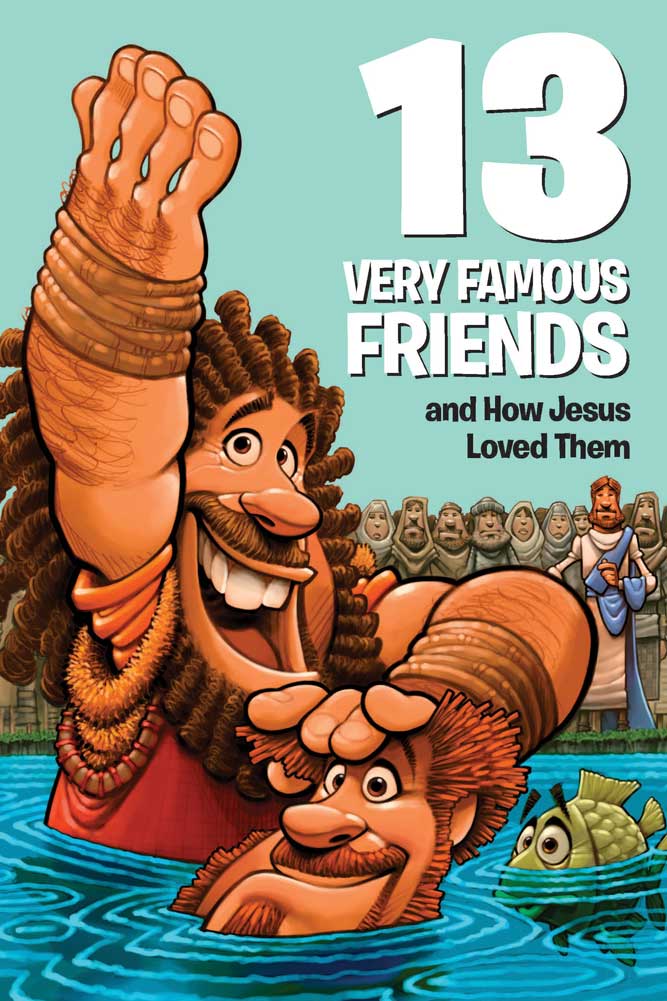THE BASICS FOR LEADERS
Supplies
The guy had it all. He was young, rich, and confident enough to ask Jesus a question. But even with all he had, he had nothing . . . because he didn’t put God first.
Having money wasn’t a sin in itself. The young man’s problem was in letting his money get between himself and following Jesus.
Letting anything get between us and following Jesus is a big mistake—one that can make it almost impossible for God to use us.
Is God first in your own life? Or is he coming in second behind your hobbies, your work or school . . . or your money (even just the desire for money)? As you experience this session with your kids, think about the importance God has in your life as well as in the lives of the kids.

OPENING ACTIVITY
Option 1: Howzitgoin’
Supplies
- Pencils
- Prepared poster
Before kids arrive, draw a line on a poster. Place a 1 on the left end of the line, a 10 on the right, and a 5 in the middle. As kids arrive, ask them to pencil in their initials on the line.
Say: If this past week was so awful you wish you’d slept through it, place your initials by the 1. If it was a great week you wish you could repeat, put your initials by the 10. Place your initials anywhere on the line that shows how you feel about this past week—except exactly on the 5. That’s because there’s no such thing as a week that’s exactly half good and half bad!
After kids have signed in, give them 30 seconds each to explain why they placed their initials where they did. Be sure to include your own initials and explain your placement on the line. Kids will begin to express themselves more over time—and hearing their stories will help you adapt this lesson to make it relevant to your kids’ lives.
Option 2: Don’t Fall!
Supplies
- Long rope or twine (enough to allow about 3 feet of rope per child—but don’t cut the rope)
Stretch out the length of rope on the floor in a straight line. Ask children to stand on the rope with both feet as they face you.
Say: Let’s pretend you’re tightrope walkers. The rope isn’t really on the floor. It’s stretched between two buildings . . . five floors up from the ground. And the guys with the nets forgot to come in today, so if you step off the rope, you’ll break every bone in your body!
Here’s what I need you to do: work together to line up from tallest to shortest, but . . . don’t step off the rope!
What to Do
Pause as kids work together to line up. Then say: Wait! I meant line up in ABC order by first name. If you’re named Aaron you’ll be on the left. Zebediah will be on the other end. Do that, please.
Pause as kids line up again. Then say: I’m sorry! This is so embarrassing! I meant line up by birthday, from January 1 to December 31.
Pause as kids line up one more time. Then drop this zinger: Uh-oh. I got one more thing wrong. The rope wasn’t really strung up from roof to roof. It’s on the floor, so it’s safe to step off and join me over here in a circle. After kids join you, discuss as a group:
- What made this game hard or easy?
- How did it feel to have other people in your way?
Say: I remember a time I needed to get somewhere and someone got in my way. It was . . . Briefly tell about a time this happened to you, perhaps when you were rushing to a class or appointment. Model the sort of story you want kids to share.
Then say: Your turn now. Find a partner and tell about a time someone was in your way when you needed to get somewhere. Tell what happened and how you felt.
Get Their Attention
After kids have had time to share with their partners, get their attention. Say: Thanks for sharing. When someone or something gets in our way, we usually don’t like it. I don’t want anything between me and the hospital if I have to get there. And when you have to go to the bathroom, it’s no fun to find a line of people waiting ahead of you! When we want to do something but someone or something is in our way, it can even be dangerous.
Today we’re going to dig into a time when a person learned there was something between him and where he needed to be. But first, let’s do some sculpting!
BIG MISTAKE GAME
Crown Me
Give each child a length of aluminum foil. Say: News flash! We’ve just discovered that you are all crown princes and princesses of the tiny nation of Limmilock. The royal crowns—which are covered with jewels—are being sent, but for now you’ll have to make your own. Take a few minutes and make the coolest crown you can with the precious silver I’ve just given you. Extra points for pointy tops and fake diamonds!
Allow several minutes for kids to craft crowns. Encourage them to wear their crowns while they circle up. Discuss:
- How would it change your life if you found out you were rich and famous?
- Lots of people want to be rich and famous. Why do you think that’s true?
- What do you think you’d have to give up if you were rich and famous?
- If you had to choose, would you rather be rich . . . or happy? Why?
Say: Thanks for sharing your thoughts. I have another news flash, by the way. Yes, as a royal person you’re totally rich now, but it seems that being rich is a problem for you. Ask:
- What problems might you have if you were rich?
Say: Thanks for sharing your thoughts. Put your crowns aside, and let’s find out why being rich was a problem for a guy who met Jesus.

NO MISTAKE BIBLE STORY
Price Tags
Supplies
- Index cards (2 per child)
- Pencils
- Bible
Ask kids to join you in forming a circle, seated on the floor. Give each child two index cards and a pencil.
Instruct kids to write on the front of one card how much all their stuff is worth. If they have a bike worth $100, figure that in. Plus their clothes are worth some money . . . and then there’s sports equipment or musical instruments. Tell them it’s not important they get an exact number; close is close enough.
When they’ve finished, continue. Say: Now on the back of that card, do the math to double that amount, because you probably forgot something (pause). Now double that amount again. Because you forgot something else, that’s why (pause). OK—now add $1 million to your number. (pause) Now go back to the front of the card, cross out what you first wrote, and write the new, bigger number there (pause).
- How does it feel to be really, really rich?
It’s nice to have lots of money. It means you don’t have to depend on others to give you things. It means you can get the stuff you want without having to wait. It’s fun! But it also means you’re sort of like a rich guy who came to Jesus with a question. Listen to this . . .
Read aloud Luke 18:18-23.
Then discuss as a group:
- What would you say if I told you to give away all that money on your card? Why?
- What would you say if Jesus told you to do it? Why?
- Do you think Jesus means for all rich people to give away all their money? Why or why not?
Say: Jesus never said that all rich people have to give away everything they own. But that’s what he told this man to do . . . and the man wouldn’t do it. On your other card write: treasure in Heaven.
After they’ve done so, read again Luke 18:22 and ask:
- What do you think Jesus meant by “treasure” in Heaven?
Help kids conclude that heavenly treasures aren’t material things but things like real happiness, real safety, being forgiven, and living forever with Jesus in Heaven. Thank kids for sharing their answers.
Continue
Then continue: Now pick up your two cards.
- Which of those cards is worth the most: your big amount of money or treasure in Heaven?
After kids share their answers, continue. Say: Please tear up the card that’s worth the least. (pause) If you tore up the money card, I think you made a good choice. Pleasing God and being with him forever is something you can’t buy with money. It’s worth more than all the money in the world!
The rich young man loved money more than Jesus. He hung onto his money instead of trusting Jesus and following him—and that was a big mistake. You see, money is something that doesn’t last. Even if we have millions of dollars, when we die it goes away. We can’t take it with us. But eternal life in Heaven is something we can’t lose—it’s forever.
It’s hard to give up something we have now so God can bless us later. Even Jesus’ followers didn’t quite understand how that worked.
Read aloud Luke 18:24-30.
- What’s something you’ve given up—or you’ve seen someone else give up–to better follow Jesus? Maybe it was giving up doing something with your friends that seemed fun–but was wrong. Or maybe you’ve given up buying something for yourself so you could give the money to help someone.
Allow kids to think about this and share. Then say: God wants us to put him first—because that lasts forever. Don’t let money—or anything—get in the way of following Jesus!
CLOSING PRAYER
Betcha Can’t Prayer
Supplies
- $1 bills (1 per child—but you’ll get them back!)
Ask kids to stand against a wall, their heels tight against the wall. Place a $1 bill on the floor in front of each child. Ask the kids to lean down and pick up the $1 bills without bending their knees or moving their feet. They won’t be able to do it.
Have kids kneel, pick up the $1 bills, and remain kneeling while you say: It’s easy to get excited about money and what it can buy. That’s why money is dangerous; we can stay so excited about money that we start loving money more than Jesus. Then the money gets between us and God. It scoots God out of the way. Please hold the $1 bills you’ve picked up, and let’s pray while we’re still kneeling.
Pray: God, thank you for taking care of us. Help us to look to you for what we need and never trust money more than you. Help us always to put you first in our lives. In Jesus’ name, amen.
Ask kids to stand and pass the $1 bills back to you. Say: Yes, you have to give the money back. I don’t want you to be tempted like that rich young man!
EXTRA-TIME ACTIVITY
Option 1: Making Money
Supplies
- Paper
- Pencils
- Paper money from your wallet
Give kids each a sheet of paper and ask them to draw a $1 million bill on one side of the paper. Show them paper money from your wallet as a sample, but tell them they can make any changes they’d like to their bills. Give them two minutes or less to complete their bills.
When time is up, have kids trade their papers with someone else and then, on the back of those $1 million bills, write (or draw) how they’d spend the money.
Say: This time you’ll have just one minute. Write (or draw) clearly—someone else will read what you’ve written.
After a minute has passed, ask kids to trade bills back with the person who drew the front of the bill. Say: Quickly look at what your partners wrote and then say to each other: “Looking at your paper, I think you like ________.”
Get Their Attention
After kids talk together, draw their attention to you.
- Here’s a question for all of us: what did you find on your list that might show that your partner loves and follows Jesus?
After kids share, say: How we spend our money says a lot about what we think is important. That’s true for grown-ups, and that’s true for kids too. If you spend all your money on yourself, maybe your money is getting between you and Jesus.
Don’t feel bad if your list didn’t have “give money to the church” or “take care of hungry people” on it—lots of grown-ups wouldn’t write those things either. But let’s never make the same mistake as the rich young man: letting money become more important than Jesus. God wants us to put him first.
Collect your money and the pencils. Encourage kids to take their $1 million bills home and place them somewhere as a reminder that Jesus is more important than money.
Option 2: Perishable
Supplies
- Index cards (5 per child)
- Pencils
- Food item with a “best when used by” date on it
Hold up the food item and point out the “best when used by” date. Say: The food in this container is perishable. That means it will someday spoil and have to be thrown out. It’s not meant to last forever.
And neither are other things we have. Someday you’ll outgrow your favorite clothes. That giant TV you love to watch will someday quit working. The bike you saved and saved to buy will someday be a pile of rust.
What lasts forever are people—not things. God created us to last so that even when our bodies die, we can still be with him someday in Heaven. But our stuff? That’s all perishable; it won’t last forever.
Make Visual
Give each kid five index cards to make “perishable” tags and then place the tags on or leaning against perishable items in the room: chairs, tables, even walls.
Then take kids on a quick tour of the room. If time permits, the group can chat about how long some items might last. Then say: See? It’s all perishable. Even this building will one day be gone.
- How does it feel knowing that nothing is made to last forever?
- How does it feel to know that you were made to last forever? (Be sure kids understand that our bodies are perishable but that we’ll get new ones.)
- The rich young man had a lot of perishable stuff. He hung onto that instead of letting it go and hanging onto Jesus. What can you do now to help you not make that mistake when you’re a grown-up? (Steer the discussion toward the idea of being happy with few things rather than asking for more and more.)
After kids have answered, say: The rich young man made a big mistake—and we don’t know if he ever changed his mind and decided to put Jesus first. I hope so—and I hope with all my heart that you all decide to put Jesus first too.
Option 3: Inquiring Minds Want to Know
Gather kids in a circle. Ask: The rich young man put money first. Money got in the way of his following Jesus. What other things might we let get in the way? What things might we start loving more than Jesus?
See more lessons like this one, here!

13 Very Famous Friends and How Jesus Loved Them

13 Very Famous Friends and How Jesus Loved Them









